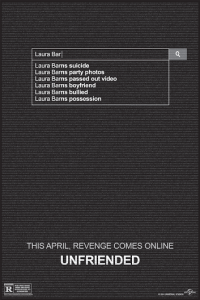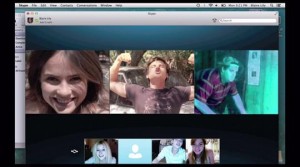What do we deserve? This question is at the heart of Levan Gabriadze’s poltergeist revenge flick, Unfriended. Clocking in at a lean eighty-two minutes, the action of the film occurs in real time on the anniversary of a popular high school girl’s bully-driven suicide and plays out solely within the confines of popular girl Blaire’s (Shelley Hennig) MacBook screen and those of her friends with whom she video chats. An orgy of evidence that millennials do, in fact, live on the Internet, Unfriended performs its exposition through a constant stream of emails, YouTube (along with the egregious use of, considering the otherwise realistic depiction of young people’s online behavior, Yahoo) searches, and downloads.
That computers literally, repeatedly frame the film’s events allows for swift exposition. The first two scenes consist of one video search, in which a girl identified as “Laura” shoots herself in the face while others look on offscreen, juxtaposed with another that shows the same girl drunkenly lying on a table at a party with a boy on top of her. This alludes to what the audience finds out in due time: the girl in both videos, Laura Barns (Heather Sossaman), killed herself a year prior because an embarrassing video leaked online and led many anonymous harassers to push her to a final, grotesque end.
The film’s more realistic content has a very ripped-from-the-headlines feel, but it builds the relatability of its teenaged characters rather than pigeonholing them. The young actors of Unfriended seem game to portray characters not wholly possessing the naiveté expected of people their age, while also becoming vulnerable in their self-deception. They seem relatively archetypal, given that they comprise a high school crowd of mean kids, but screenwriter Nelson Greaves provides dialogue that conveys how these are really young adults capable of witty observations, deep feelings, and intense regret. These complex characters don’t necessarily even out to being great people, though. For example, when one character admits to raping an acquaintance and subsequently forcing her to have an abortion, the characters treat those actions as secondary to infidelity. The only characterization that truly hits a false note is how quickly Blaire’s boyfriend, Mitch (Moses Jacob Storm) asserts the supernatural status of their group’s video chat invader. In fact, the movie essentially hinges on Mitch believing in ghosts, which moves the plot along without truly earning the progression.
Unfriended could have just been ghost-induced torture porn, providing people with little to nothing to say about its ability to build suspense, but it actively finds real catch and release in the minutiae of visual culture. The layering of different windows also functions as a barrier between the film’s continuing action and the development of Blaire’s individual story. The dialogue alternates between written and spoken chatting, sometimes with long periods of silence, and Blaire repeatedly begins and deletes messages that provide backstory only to the viewer. One particularly extended sequence shows a savvy character’s attempt to disseminate software to rid the group’s computers of what they assume is malware created for the purpose of pranking them. In the internal world of Unfriended, which is decidedly also the world of the viewer, clicking a link carries as much weight as choosing death itself. While watching, I heard some adults in the audience groaning that these kids work way too hard to kick an unwelcome guest and continue their video chat, but the actual teens in front of me laughed their asses off at this: this is exactly how much effort anyone who constantly uses the Internet would put into talking to their friends, especially since this sort of social interaction provides a convenient way around curfews. If it functioned as absolutely nothing else, Unfriended would provide a mostly realistic depiction of a specific set of contemporary online norms for the time capsule.
It is worth mentioning that Unfriended is also hilarious. So strongly do Blaire and her friends resist the notion that they cannot somehow win Laura’s “game” that their quibbling over the respective humiliations bestowed upon them becomes a darkly funny exercise in futility. Early promotional materials gave away the plot enough that each male character’s early reveal of a potentially lethal weapon feels equally comical and ominous. Establishing lines like, “I got the weed but he’s out of molly,” the sight of one character smoking an e-cig, and a scene in which the boys in the group explain the entire concept of trolling to their female friends make this film feel like a safe space, much like the Internet often feels before certain groups and individuals invade conversations and repurpose them to ends that are uncomfortable at best. As the film turns away from the lighthearted and its characters begin to take their situation seriously, however, the humor becomes a respite less frequently offered to the viewer and the viewed. The few music moments are excellent here, and are often employed to frustrate already traumatized characters; anyone whose computer runs Spotify slowly knows the basis of this feeling, even without adding a poltergeist.
Unfriended avoids drawing explicit comparisons between supernatural possession and the crowd-induced mania, but their relationship is inextricable from the plot’s advancement. An unidentifiable mass of people engage in Laura’s initial humiliation and bully her even more anonymously later. Laura’s friends ultimately face death en masse following those events, while blaming unidentified peers for their complicity in the events that occurred prior to those of the film. The film is not particularly gory, but it shows perhaps a few too many instances of brutal, self-inflicted violence to truly frustrate audiences with its lack of formal catharsis the way, say, both versions of Michael Haneke’s Funny Games did. However, it does make the point that we don’t necessarily deserve the satisfaction of catharsis from the simulated snuff films we gleefully watch. The spectacle doesn’t owe us anything.
The folks promoting comparisons between Unfriended and found footage films like The Blair Witch Project and Paranormal Activity are boring. Those films rely heavily on the found footage gimmick as the basis for the film, while Unfriended utilizes the computer screen as a mechanism to confine the audience itself within a commonplace setting. The film manages to do with technology what no film in recent memory has: it makes it normal. The banality of the Internet’s presence in our lives allows easy identification with the characters of the film, who jump between their screens with a rhythm viewers already have an intuitive grasp of. Computers are the most certain thing in this movie; they’re the ordinary day that goes woefully wrong. Unfriended is too perfect in its realization to create another sub-genre, though. It’s the naked singularity of horror: A reification of everything the viewer already knows.
Unfriended is now showing in theaters.



